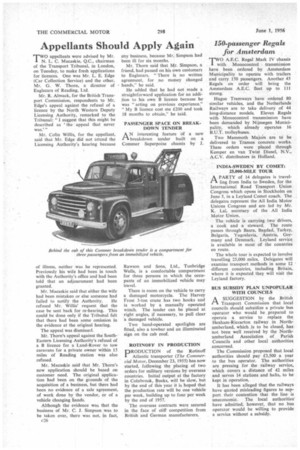Appellants Should Apply Again
Page 76

If you've noticed an error in this article please click here to report it so we can fix it.
TWO appellants were advised by Mr. N. L. C. Macaskie, Q.C., chairman of the Transport Tribunal, in London, on Tuesday, to make fresh applications for licences. One was Mr. L. E. Edge (Car Collection Service) and the other, Mr. G. W. Thorn, a director of Eaglecars of Reading, Ltd. Mr. R. Almack, for the British Transport Commission, respondents to Mr. Edge's appeal against the refusal of a licence by the North Western Deputy Licensing Authority, remarked to the Tribunal: "I suggest that this might be described as 'the appeal that never was.' " Mr. Colin Willis, for the appellant, said that Mr. Edge did not attend the Licensing Authority's hearing because of illness, neither was he represented. Previously his wife had been in touch with the Authority's office and had been told that an adjournment had been granted.
Mr. Macaskie said that either the wife had been mistaken or else someone had
failed to notify the Authority. He refused Mr. Willis' request that the case be sent back for re-hearing. This could be done only if the Tribunal felt that there had been some omission in the evidence at the original hearing.
The appeal was dismissed,
Mr. Thorn's appeal against the SouthEastern Licensing Authority's refusal of a B licence for a Land-Rover to tow caravans for a private owner within 15 miles of Reading station was also refused. Mr. Macaskie said that Mr. Thorn's new application should be based on customer need. The original application had been on the grounds of the acquisition of a business, but there had been no evidence of a sale agreement, of work done by the vendor, or of a vehicle changing hands. Although the evidence was that the business of Mr. C. J. Simpson was to be taken over, there was not, in fact,
c26 any business, because Mr. Simpson had been ill for six months.
Mr. Thorn said that Mr. Simpson, a friend, had passed on his own customers to Eaglecars. "There is no written agreement, for no money changed hands," he said. He added that he had not made a straightforward application for an addition to his own B licence because he was "acting on previous experience." "My B licence cost me £200 and took 18 months to obtain," he said.
PASSENGER SPACE ON BREAKDOWN TENDER
AN interesting feature of a new breakdown tender built on a Commer Superpoise chassis by J.
Rawson and Sons, Ltd., Tunbridge Wells, is a comfortable compartment for three persons in which the occupants of an immobilized vehicle may travel.
There is room on the vehicle to carry a damaged motorcycle. The Harvey Frost 3-ton crane has two hooks and is worked by a manually operated winch. The tender can be placed at right angles, if necessary, to pull clear 'a damaged vehicle. Two hand-operated spotlights are fitted, also a towbar and an illuminated sign on the cab roof.
ROT1NOFF IN PRODUCTION
RODUCTION of the Rotinoff I Atlantic transporter (The Commercial Motor, December 23, 1955) has now started, following the placing of two orders for military versions by overseas countries. Initial output at the factory in Colnbrook, Bucks, will be slow, but by the end of this year it is hoped that the production rate will be one vehicle per week, building up to four per week by the end of 1957.
The overseas contracts were secured in the face of stiff competition from British and German manufacturers.
150-passenger Regals for Amsterdam
TWO A.E.C. Regal Mark IV chassis with -Monocontrol transmission have been ordered by Amsterdam Municipality to operate with trailers and carry 150 passengers. Another 45 Regals on order will bring the Amsterdam A.E.C. fleet up to 1 1 l strong. Hague Tramways have ordered 80 similar vehicles, and the Netherlands Railways are to take delivery of 44 long-distance models. Eleven Regals with Monocontrol transmission have been demanded by Nijmegen Municipality, which already operates 16 B.U.T. trolleybuses. Two Mammoth Majois are to be delivered to Tramos concrete works. These orders were placed through Kemper en van Twist Diesel, N.V., A.C.V. distributors in Holland.
INDIA-SWEDEN BY COMET: 25,000-MILE TOUR
A PARTY of 14 delegates is travel ling from India to Sweden, for the International Road Transport Union Congress which opens in Stockholm on June 5, in a Leyland Comet coach. The delegates represent the All India Motor Unions Congress and are led by Mr. K. Lal, secretary of the All India Motor Union. The vehicle is carrying two drivers, a cook and a steward. The route passes through Basra, Bagdad, Turkey, Bulgaria, Yugoslavia, Austria, Germany and Denmark. Leyland service is available in most of the countries en route. The whole tour is expected to involve travelling 25,000 miles. Delegates will examine transport methods in some 12 ' different countries, including Britain, where it is expected they will visit the Leyland factory.
BUS SUBSIDY PLAN UNPOPULAR WITH COUNCILS
A SUGGESTION by the British 1--1 Transport Commission that local councils should subsidize a private bus operator who would be prepared to operate a service to replace the Hexham-Riccarton railway in Northumberland, which is to be closed, has not been well received by the Northumberland Association of Parish Councils and other local authorities concerned. The Commission proposed that local authorities should pay £3,500 a year to the bus operator. The authorities are pressing for the railway service, which covers a distance of 42 miles and serves 14 stations and halts, to be kept in operation. It has been alleged that the railways have quoted rnisleading figures to support their contention that the line is uneconomic. The local authoritieshave admitted, however, that no bus operator would be willing to provide a service without a subsidy.




























































































































































































































































